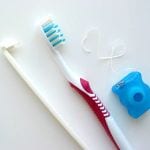 If you’re looking for ways to freshen up and make your smile sparkle this spring, why not add a couple of extra minutes to your daily oral hygiene regime and incorporate flossing or inter-dental brushing? You often hear dentists stressing the importance of flossing in addition to brushing, but the reality is that most people focus solely on brushing.
If you’re looking for ways to freshen up and make your smile sparkle this spring, why not add a couple of extra minutes to your daily oral hygiene regime and incorporate flossing or inter-dental brushing? You often hear dentists stressing the importance of flossing in addition to brushing, but the reality is that most people focus solely on brushing.
Why is flossing so beneficial?
Flossing involves passing very thin tape known as dental floss through the cracks between the teeth. It helps to dislodge food debris and remove bacteria and it’s really important because it cleans the parts of the mouth that can’t be reached easily with a toothbrush. Flossing helps to reduce the risk of plaque formation, which in turn decreases the chances of decay, bad breath and gum disease. Flossing can also help to reduce staining and discolouration.
How often should I floss?
We recommend flossing on a daily basis. It only takes a minute or two, but it can really make a difference to oral health. If you have any questions about flossing or you’d like advice on how to floss, our dentists and dental hygienists will be happy to help.
Alternatives to flossing
If you don’t like flossing or you find it too fiddly, we recommend using inter-dental brushes. These small, hand-held brushes are specially designed to clean between the teeth. They come in various sizes and your dentist can show you how to use them.
Should my gums bleed when I floss?
If you’re flossing for the first time, you may find that your gums bleed because you’re not used to it. However, if you’re used to flossing and you notice bleeding, this may be a sign of gum disease and we advise you to call and make an appointment.
Tags: City of Leeds Dentist Flossing, flossing and brushing Leeds, flossing Leeds, Teeth flossing Leeds







